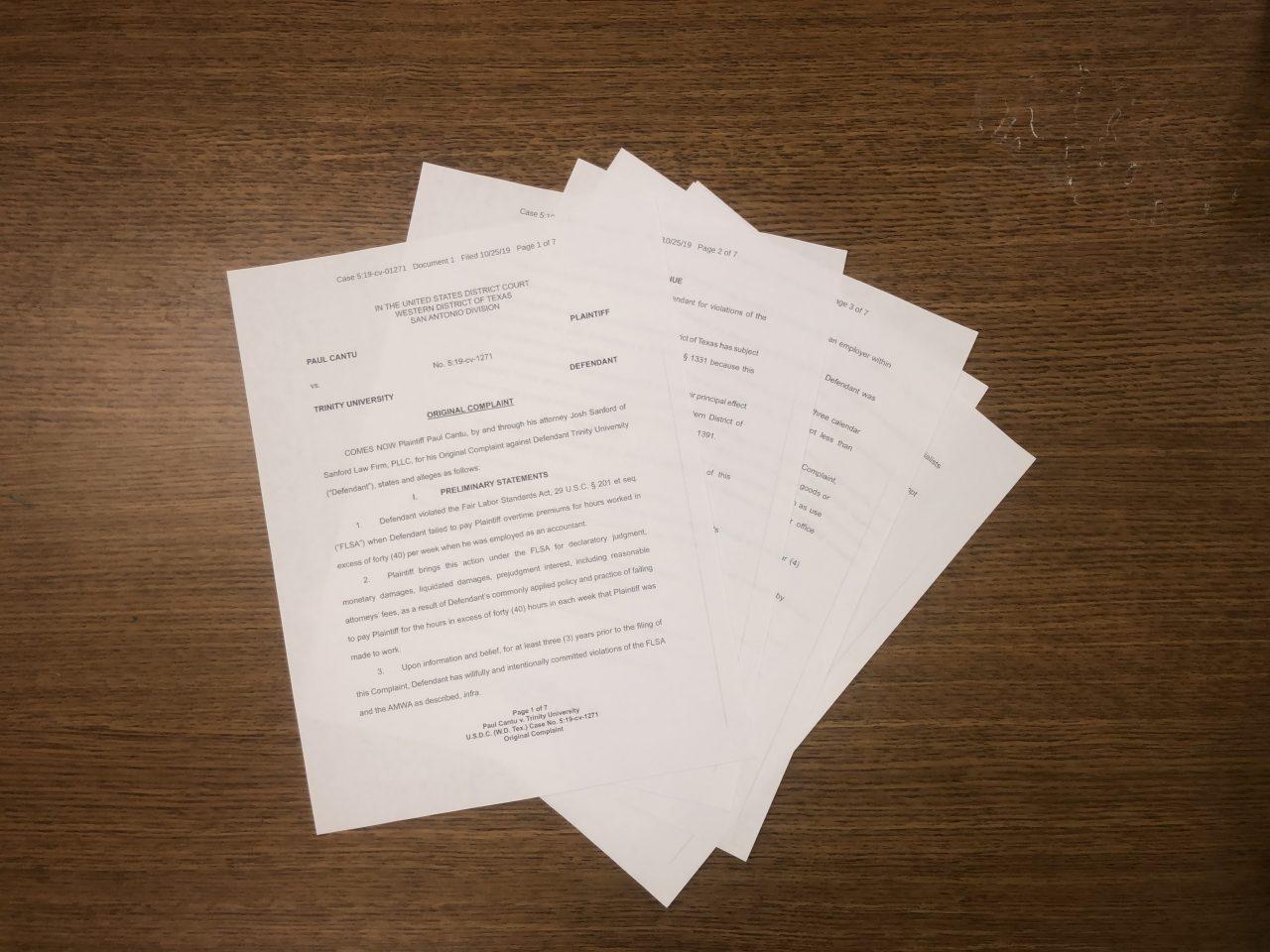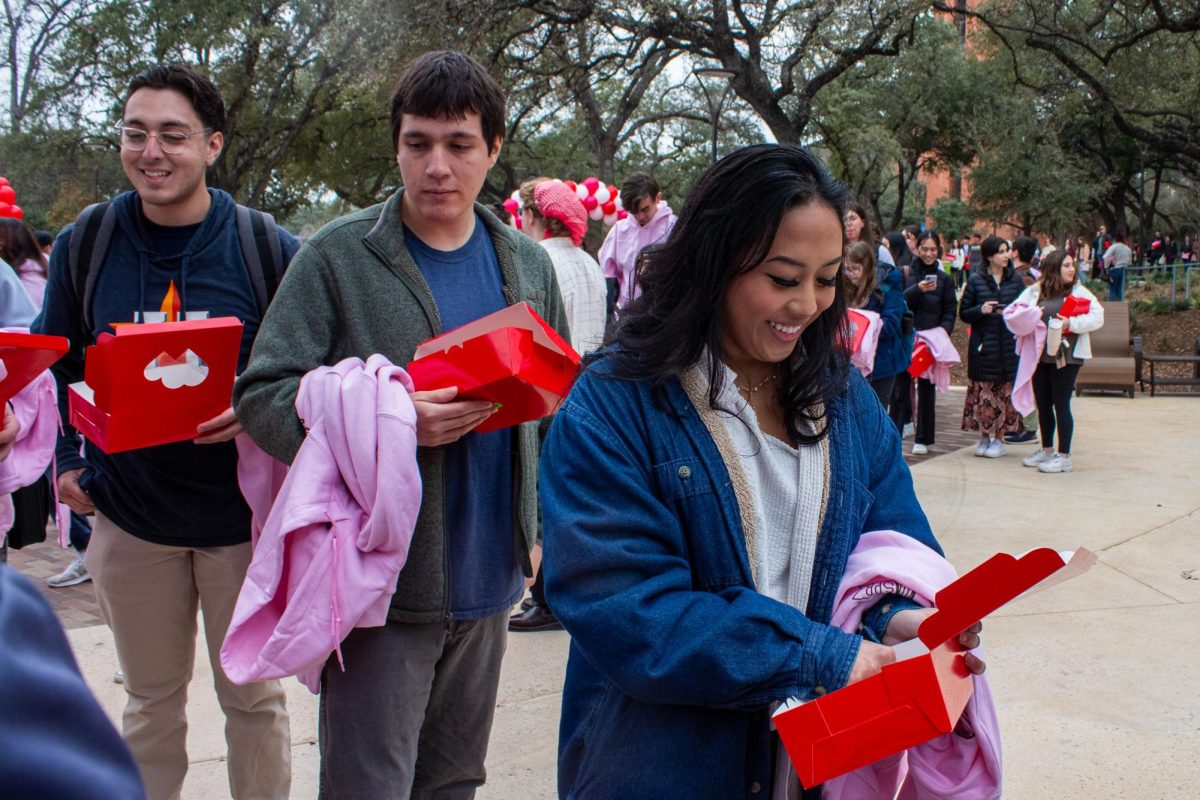Photo by Kathleen Creedon
Trinity University is being sued in federal court by former accountant Paul Cantu for alleged failure to pay overtime in accordance with the Fair Labor Standards Act (FLSA).
According to the lawsuit, Cantu “routinely” worked more than 40 hours per week as a salaried employee without additional compensation from January 2014 through August 2018. Excluding certain exempt categories, the FLSA requires all employees be paid time-and-a-half for each hour over 40 per week.
Trinity’s general counsel Rachel Rolf and vice president for Finance and Administration Gary Logan did not respond to Trinitonian inquiries. In an email response to Trinitonian requests for comment, vice president for Marketing and Communications Tess Coody-Anders said Trinity is aware of the case but declines to comment “until such time as the university has had the opportunity to review the lawsuit.”
Cantu’s lawyer — Little Rock, Arkansas-based attorney Josh Sanford— says they are seeking at least double what Trinity allegedly failed to pay Cantu.
“When an employee is denied wages in violation of the FLSA, in addition to recovering those wages, they are entitled to — in almost every circumstance — an equal amount as something that the law calls ‘liquidated damages,’” Sanford said. “Which is a monetary expression of several different factors, including the time-value of money, the inconvenience of the violation of their right, the lack of the assessment of pre-judgment interest and, presumably, some nod towards discouraging other defendants to violate the law.”
The FLSA has a two to three-year statute of limitations — three years if the employer willfully and knowingly violated the FLSA, which the lawsuit alleges Trinity did. Because the suit was filed this October 25, 2019, the case will focus on Cantu’s work from Oct. 25, 2016, through the end of his time at Trinity.
The FLSA defines a number of employee categories that are exempt from overtime pay. Trinity could argue Cantu’s work falls under the “professional” exemption. The Department of Labor website outlines several tests which must all be met in order for this exemption to apply. Trinity bears the burden of proof if the university wishes to claim Cantu as an exempt employee; they must prove his work meets all the criteria outlined by FLSA.
To be exempt from overtime pay, employees must be paid a salary of at least $455 per week, their duties must include the “consistent exercise of discretion and judgment,” and their work must require advanced knowledge “customarily acquired by a prolonged course of specialized intellectual instruction.”
According to Cantu’s LinkedIn profile, he attended the University of Houston and the University of Texas at San Antonio, where he obtained a bachelor’s and master’s degree in accounting, respectively. But Cantu’s education in accounting does not affect this case if his day-to-day duties didn’t require the use of that knowledge.
“They’re going to weigh heavily on what the person was actually doing as opposed to some general title or job description,” said San Antonio-based employment lawyer Melissa Morales Fletcher, who is not involved in this lawsuit.
According to Sanford, Cantu’s day-to-day work was more clerical than that of a typical professional accountant.
“The word ‘accountant’ has different meanings to different people,” Sanford said. “And Mr. Cantu was a bookkeeper, which some people call an accountant. Trinity calls [the role] an accountant, but if they don’t use him as an accountant — if they use him as a bookkeeper — the law may not allow them to deny him overtime.”
Fletcher emphasized the importance of Cantu’s daily duties to the outcome of this case.
“Remember this: the title or classification of an individual is not key,” Fletcher said. “What’s key is what those individuals were doing as their job duties.”
In the seven-page complaint filed with the United States District Court for the Western District of Texas, Sanford emphasized several apparently clerical, bookkeeping activities. The duties listed include maintaining asset records, formatting large amounts of data, tracking and monitoring expenses and updating records.
The filing also said Cantu did not supervise other employees and did not “exercise discretion and independent judgment with respect to matters of great significance.”
Most parties in unpaid overtime lawsuits reach a court-approved settlement rather than going through protracted, costly litigation.
“Settlements are for the purpose of ‘let’s move on and minimize expenses,’ ” Fletcher said.
If a violation is found, the FLSA requires defendants to compensate plaintiff attorney fees in addition to paying their own defense counsel.
“Some of these cases — depending on how expensive they are — you’re looking at 50, 75 [or] 100 thousand in defending them alone,” Fletcher said.
According to Fletcher, these cases rarely end with an admission of wrongdoing.
“Most of the time, if there is some type of resolution or settlement, the defendant is never going to admit liability,” Fletcher said. “Just as the plaintiff is not going to admit that they didn’t have a strong enough case and that’s why they settled.”
The FLSA allows plaintiffs to file on behalf of other employees in a similar position. In the first filing, Cantu’s complaint concerns only himself, but he could attempt to include other current Trinity employees in the lawsuit later in the litigation process. This “collective action” could lead to a larger settlement involving multiple employees.
“What will happen — if the court certifies the collective action — is that most likely the employer shares the name of individuals who are in a similar situation, and notice is given out to those individuals, and potentially they have the option of what we call ‘opting in to the lawsuit,’ ” Fletcher said. “That won’t happen here unless it’s requested. It is a potential.”
If Trinity realizes a violation of employees’ right to overtime pay has occurred or is still occurring outside of Cantu’s case, the university may self-report the violation to the Department of Labor. An internal, out-of-court settlement will not protect the university from future litigation.
The United States District Court for the Western District of Texas did not respond to inquires about the start date of the trial.













